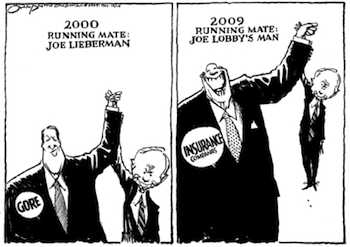- MENU
- HOME
- SEARCH
- WORLD
- MAIN
- AFRICA
- ASIA
- BALKANS
- EUROPE
- LATIN AMERICA
- MIDDLE EAST
- United Kingdom
- United States
- Argentina
- Australia
- Austria
- Benelux
- Brazil
- Canada
- China
- France
- Germany
- Greece
- Hungary
- India
- Indonesia
- Ireland
- Israel
- Italy
- Japan
- Korea
- Mexico
- New Zealand
- Pakistan
- Philippines
- Poland
- Russia
- South Africa
- Spain
- Taiwan
- Turkey
- USA
- BUSINESS
- WEALTH
- STOCKS
- TECH
- HEALTH
- LIFESTYLE
- ENTERTAINMENT
- SPORTS
- RSS
- iHaveNet.com: Politics
by Jules Witcover

Joe Lieberman and Insurance Companies (© Jack Ohman)
Senator Joe Lieberman's latest declaration of independence from the party that once gave him one of its highest rewards is again paying it back with another display of self-serving egotism.
The 2000 Democratic vice-presidential nominee, who turned independent to save his
Recently, Lieberman jolted Senate Majority Leader Harry Reid by declaring he intended to deny him the 60th
vote needed to avoid a Republican filibuster. He said he could not vote either for a public option or extending
Both provisions had been advanced by Reid and other reform advocates to hold 60 Democratic votes for the bill in the face of unanimous Republican opposition. Lieberman's declaration triggered a Senate Democratic caucus scurrying to find a way to salvage President Obama's prime first-year legislative initiative.
Ever since Lieberman jumped the Democratic ship in 2006 and narrowly won reelection as an independent -- with strong Republican
support and loyal Democrats holding their noses -- he has reveled in his position as the
His boast of holding the make-or-break vote has been in sharp contrast with the
On health-care reform, Lieberman is arguing now that the bill painstakingly crafted by Reid and other Democrats will put the government too deeply into the health-care business and will greatly increase the federal deficit -- concerns shared by congressional Republicans.
But an immediate suspicion of Lieberman's behavior is that he is openly carrying the mail of the huge insurance industry centered in Hartford.
Over the years, according to the New York Times, the insurance business has channeled more than a million dollars into his campaign coffers.
With members of his old party outraged at Lieberman's maneuvers, he appears increasingly focused on trying to cement the support of those independents and Republicans who saved his political skin in 2006, with an eye on reelection in 2012.
Ever since Lieberman was Al Gore's running mate on the Democratic national ticket that narrowly lost the 2000 Supreme Court decision and put Republicans George W. Bush and Dick Cheney in office, he has been a nagging headache to his old party.
At a 2001 meeting of the
Actually, Lieberman himself brought little to the Democratic ticket, even as the first Jewish-American nominee for national office in Florida. The Sunshine State narrowly went for Bush-Cheney, despite a substantial Jewish vote there, costing the Democrats the state and the election.
Had Gore chosen as his running mate then Sen. Bob Graham of Florida instead of Lieberman, that election and history might have been far different. Graham at the time was one of the strongest vote-getters ever in the Florida, where he previously had been a very popular governor.
Lieberman, puffed up by his experience as a national candidate in 2000, launched a presidential campaign of his own for 2004. He got nowhere with an unimaginative, self-delusional effort and soon dropped out.
In his 2006
Lieberman, while organizing with the Democrats and retaining a committee chairmanship, has been a defiant thorn in their
side ever since. He may love having to be courted on key votes, but no doubt he is assuring a well-financed Democratic
candidacy against him if he seeks reelection to the
AMERICAN POLITICS
WORLD | AFRICA | ASIA | EUROPE | LATIN AMERICA | MIDDLE EAST | UNITED STATES | ECONOMICS | EDUCATION | ENVIRONMENT | FOREIGN POLICY | POLITICS
Receive our political analysis by email by subscribing here
Democrats' Joe Lieberman Problem | Jules Witcover
© Tribune Media Services, Inc